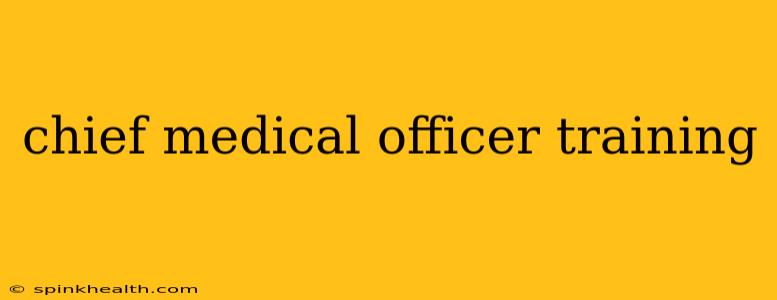The role of a Chief Medical Officer (CMO) is a demanding yet incredibly rewarding one. It's a position that requires not only deep medical expertise but also a sophisticated understanding of business, leadership, and strategic planning. Aspiring CMOs often ask, "How do I get there?" This journey isn't a single, straight path, but rather a carefully cultivated blend of experience, education, and strategic career choices. Let's explore the multifaceted world of CMO training.
What Does CMO Training Entail?
The path to becoming a CMO isn't a standardized program you can simply enroll in. It's a culmination of various experiences and learning opportunities, carefully chosen to build the necessary skills and expertise. Think of it as a personalized curriculum shaped by your background and career aspirations.
It's a blend of:
- Formal Education: A strong foundation in medicine is paramount, typically requiring an MD or DO degree. Further specialization through residencies and fellowships can significantly enhance your candidacy. An MBA or MPH can prove invaluable, providing crucial business acumen and public health understanding.
- Clinical Experience: Years of hands-on experience in a clinical setting are vital. This isn't just about practicing medicine; it's about gaining leadership experience within a team, managing resources, and understanding the complexities of healthcare delivery.
- Leadership Roles: Progression through leadership roles within a hospital or healthcare system is essential. This might include roles such as department head, medical director, or associate CMO. These positions provide opportunities to hone leadership skills, manage budgets, and navigate complex organizational structures.
- Continuing Medical Education (CME): Ongoing professional development is crucial. CME courses focused on healthcare administration, strategic planning, finance, and regulatory compliance are all beneficial.
- Networking: Building a strong professional network is invaluable. Attending industry conferences, joining professional organizations, and engaging with other healthcare leaders helps you stay abreast of current trends and build relationships that can open doors to future opportunities.
What are the Key Skills Needed to Become a CMO?
Becoming a successful CMO requires a unique blend of skills. It's not enough to be an excellent physician; you need to be a strategic thinker, an effective communicator, and a skilled leader.
- Medical Expertise: A deep understanding of medical practice, clinical research, and healthcare trends is non-negotiable.
- Business Acumen: CMOs must understand financial statements, budgeting, strategic planning, and risk management.
- Leadership & Management: Strong leadership skills, the ability to motivate teams, and effective delegation are crucial.
- Communication & Interpersonal Skills: CMOs need to communicate effectively with physicians, staff, patients, and stakeholders.
- Regulatory Knowledge: A thorough understanding of healthcare regulations and compliance is essential.
What Education is Required to Become a Chief Medical Officer?
While there's no single prescribed educational pathway, a solid foundation is essential.
- MD or DO Degree: This is the cornerstone of any CMO's qualifications.
- Residency and Fellowship (Optional but highly recommended): Specialization in a relevant field can enhance your candidacy.
- MBA or MPH: These advanced degrees provide critical business and public health knowledge.
How Long Does it Take to Become a Chief Medical Officer?
The timeline varies significantly depending on individual experience and career progression. It often takes 15-20 years or more to acquire the necessary experience and skills to become a CMO.
What is the Career Path to Becoming a Chief Medical Officer?
There’s no single path, but a common progression might involve:
- Medical School and Residency: Build your foundation in medicine.
- Clinical Practice: Gain experience in a clinical setting.
- Leadership Roles: Progress through roles such as department head or medical director.
- Associate CMO or similar role: Gain experience in a senior medical leadership position.
- CMO Position: Transition to the top medical leadership role.
Are there any specific certifications needed to be a CMO?
While no specific certifications are mandatory, several certifications can enhance your credentials and demonstrate your commitment to professional development. These might include certifications in healthcare administration, leadership, or specific areas of medical expertise. Consider these as valuable additions to your qualifications.
The journey to becoming a Chief Medical Officer is a marathon, not a sprint. It demands dedication, hard work, and a commitment to continuous learning and development. But with the right preparation and strategic planning, the rewards are immense, both personally and professionally.

